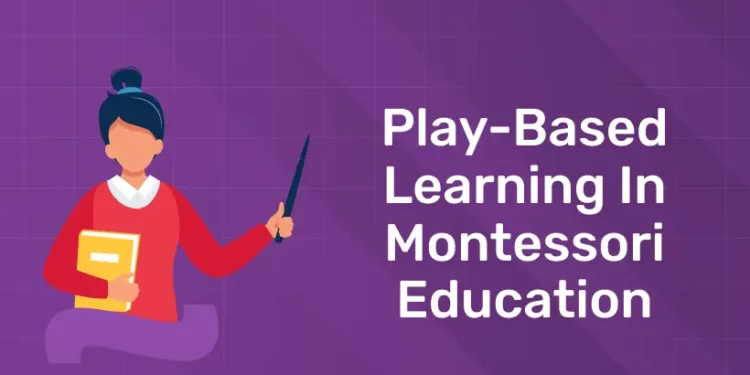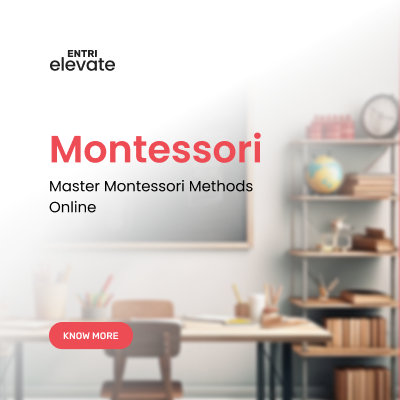Table of Contents
Play-based learning is not a mere time killer for the Montessori educational system. For the Montessori system of learning, it is the soul and source of learning. Learning in Montessori education starts from the concept of play. The educational journey will only be fruitful through play-based learning.
The “play” is the core of Montessori education. The philosophy of Montessori education resides in play as it positively contributes to the development, education and discovery of the world. Montessori education creates a safe and happy space for the children to explore and learn together. The overall nurturing of the child happens in a Montessori classroom.
Start your journey to becoming a certified Montessori teacher! Get free Demo Here!
As per the principles of Montessori education, play is a conscious activity to engage the children purposefully with the world around them. Play always triggers them to explore and associate them with reality. They derive a sense of the play and develop the skills necessary for survival.
The personality of a child exposes itself once they engage in play-based learning. Dr Maria Montessori introduced the Montessori ways of education to expose children to their insights and knowledge about themselves. The children will slowly learn to explore their natural drive through the interaction with the world.!
Start your journey to becoming a certified Montessori teacher! Get free Demo Here!
Characteristics of Montessori Play
Montessori education facilitates quality education through play. The major characteristics of the play based education as as follows:
The activities given for the play are purposely designed as they also include the major goal of nurturing children to encounter fabrics that devise precise aptitudes. Another major characteristic of play is that the children are given the autonomy to choose the activity of their own choice.
The major purpose of play is that it will enhance the motivation element of the child. It can directly influence their self-dependency and motivation to strive for the best in their lives. Montessori play highlights tactile ventures which permits the kids to discover via straightforward manipulation of entities.
Play is incorporated in the locations of knowledge, from computation and vocabulary to artistic analyses and skills.The Montessori classroom is especially designed to prepare the children to face the world and the reality with newfound strength.
Exploring the environment all by themselves can trigger growth and development in children. Based on the specific needs of the children, the play is designed. It creates a backdrop that asks kids to research, test, and discover through play, guaranteeing that all element of the classroom helps in the overall growth, understanding and development.
Start your journey to becoming a certified Montessori teacher! Get free Demo Here!
The instructors in Montessori education function as companions rather than managers of play. They celebrate each juvenile’s interests and developmental phase. They often call their attention to the challenges and commit without inflicting disproportionate limitations.
Teachers in the Montessori education sector are experienced in designing prospects for play that serve as a tool for proper education. The cognitive, emotional, social and physical skills will only be improved with the play. It is not only a recreational activity as per the Montessori philosophy but it is also part of the proper learning process of the children.
Self-directed and hands-on learning are the best-known learning strategies as per the teachings of Dr Maria Montessori. The communal and collective play triggers the interpersonal skills of the children. Thus, play shapes a child and gives purpose and meaning to life.
In Montessori education play is also an integral part of the personal and emotional growth of the child. The child will slowly develop the tendency to solve problems and integrate with the activity. The personal growth of the child happens slowly in a Montessori classroom when engaged in play. Through play, the overall development of a child happens.
Start your journey to becoming a certified Montessori teacher! Get free Demo Here!
The Role of Play in Montessori Education
1: What is the primary focus of the first plane of development in the Montessori method?
The key aspect of Montessori education is the belief that there is a natural tendency for the child’s mind to learn things out of curiosity. Play nurtures this curiosity by making them actively involved in child-centred learning activities which are guided by the interests of the child.
The play has a meaning that caters to the purpose of developing a child’s psychology. The cognitive skills of the child can be developed easily by introducing them to the concepts of Play. The child should be equipped to face the truths and realities of the world they dwell in.
Montessori classrooms are designed in such a way that they offer the space for discovery and investigation. The child will create the truth about the world around them by themselves. The Montessori teaching methodology thus deviates itself from the traditional mode of teaching-learning.
- Play is regarded as self-direction.
- Children can choose the activities by themselves
- The child’s interest is given priority
- Children seek knowledge and wisdom by aligning themselves with the play
- Children engage themselves in the challenging environment
- Children’s brain finds stimulating situations but they will slowly develop problem-solving skills
- Helps in the cognitive development of a child
- Encourages critical thinking
- Develops interpersonal skills
- Refine their understanding of the concepts
- Promotes the social and emotional growth of the child
- Enhances the social skills of the child
- Creates empathy in the child
- Enhances the relationship between the child
- Improves communication skills
- Allows the physical development
- Acquire motor skills and coordination skills
Start your journey to becoming a certified Montessori teacher! Get free Demo Here!
Forms and Types of Montessori Play
The Montessori education promotes play. It helps the child to understand and trust their interests and instincts. The play allows them to enhance their educational value. Read below to learn about the forms and types of Montessori play.
- Sensory Play
- Dramatic Play
- Constructive Play
- Collaborative Play
- Physical Play
Sensory Play
- The sensory play helps in developing the senses of the child
- It works on the levels of the sensory experience of the child
- The child develops an understanding of the world through sight, sound, touch and movement
- Appeals to the sensory experience of the child
- The child develops the proficiency to concentrate and distinguish things around them.
- Triggers the complex learning experience of the child
Start your journey to becoming a certified Montessori teacher! Get free Demo Here!
Constructive Play
- Engages the child through the constructive use of materials and objects around them
- Children will get the opportunity to construct or manipulate the space around them.
- Working with clay or building blocks using materials triggers their creative thinking.
- Enhances problem-solving skills
Dramatic Play
- Imaginative plays enhance the daily life skills of the child
- Reflects the real-world experience
- Explore various roles in the adult world
- Enhances the social and emotional skills
- Promotes better communication skills and interpersonal skills
- Helps in understanding social situations and promotes creativity
- Learn social ettiquettes and scoial roles
Collaborative Play
- Works inside the classroom for a common goal
- Enhances social and interpersonal skills
- Allows them to mingle with other students
- Promotes interactive learning and peer learning
Physical Play
- Increases the movement
- Enhances the coordination
- Essential to enhance motor skills
- Builds physical strength
- Promotes awareness about the body
- Part of daily exercise which turns out to be a routine that can reduce stress and anxiety
Start your journey to becoming a certified Montessori teacher! Get free Demo Here!
How Play-Based Learning Contributes to Child Development in Montessori Education
There are multiple benefits to the play-based education promoted in Montessori education. The play based education helps in cognitive development which allows the child to prepare themselves to face the world with more courage.
The child will slowly develop a tendency to solve the problems by themselves. The critical thinking skills will be boosted. They will create opportunities for themselves. The play helps in creating more interest towards the arts, science, language and mathematics.
The play in Montessori education allows the child to have a deeper understanding of the world. Interacting with peers allows the child to improve their social skills. They develop competency and a mentality to share and care. A child who plays well always develops an empathetic outlook on the outside world.
The interpersonal skills of the child will be improved and the child will be in a position to understand the emotional complexities. They will know how to deal with each situation smoothly. The emotional development of the child happens in an environment where play is an integral part.
Start your journey to becoming a certified Montessori teacher! Get free Demo Here!
The play can also boost the self-confidence and autonomy of the child. The child will take ownership of the tasks given to them. The playing space helps in nurturing the self-esteem of the child. The play also promotes the development of not only the psychology of the child but also the motor skills or physical growth. The physical health of the child will be enhanced with the help of the play.
Here are a few examples of Montessori play:
- Planting plants and trees
- Watering plants
- Identify trees, plants
- Picking up flowers
- Naming insects
- Reading stories
- Creating art using chalk
- Drawings with crayons
- Making shapes using clay
- Painting pictures
- Knowing the kitchen
- Making snacks
- Learning how to clean
- Solving puzzles
Montessori Play is a big deal which facilitates the overall growth and development of the child, physically, mentally, emotionally and socially. The holistic development of the child is important to survive in a competitive world.
The Montessori play introduces the child to the complex way of the world and allows them to explore the world on their terms. The self-directed activities allow the child to meaningfully utilise the resources around them. Montessori play equips the child to face the world bravely. Montessori play is a powerful tool for the growth and development of a child.
Start your journey to becoming a certified Montessori teacher! Get free Demo Here!
Equipping the child to face the challenges of the world is not an easy cup of tea. Entri’s Montessori Teacher Training with International Certification will allow you to specialise in Montessori education. Entri’s Montessori Teacher Training is designed to prepare teachers in the Montessori strategy of instruction.
It encircles various characteristics of teaching such as lecture planning, curriculum evolution, classroom administration, and child psychology. The course is planned to assist teachers conceive the skillfulness and understanding required to devise a favourable and cogent learning domain for their learners.
The Six Month Course provides live and recorded sessions, daily doubt clearance sessions, systematic study plans, strategic learning, study notes, resource materials, live exams, course completion certificate, CEED International, American Association Of Teachers & Trainers, UK Certifications that will help you to land on your dream join. Join the experienced faculty wing at Entri and learn how to shape the new generation methodologically.
Frequently Asked Questions
What is the sinificance of play in Montessori education?
The play can also boost the self-confidence and autonomy of the child. The child will take ownership of the tasks given to them. The playing space helps in nurturing the self-esteem of the child.
What is the purpose of play in Montessori education?
The play has a meaning that caters to the purpose of developing a child’s psychology. The cognitive skills of the child can be developed easily by introducing them to the concepts of Play. The child should be equipped to face the truths and realities of the world they dwell in.
What is the speciality of montessori classrooms?
Montessori classrooms are designed in such a way that they offer the space for discovery and investigation. The child will create the truth about the world around them by themselves.
What is the purpose of constructive play?
The constructive play engages the child through the constructive use of materials and objects around them.Children will get the opportunity to construct or manipulate the space around them.
How is the montessori play introduces the world to the child?
The Montessori play introduces the child to the complex way of the world and allows them to explore the world on their terms. The self-directed activities allow the child to meaningfully utilise the resources around them. Montessori play equips the child to face the world bravely
Is play in Montessori education a concious act?
Yes. The play is a conscious activity to engage the children purposefully with the world around them. Play always triggers them to explore and associate them with reality. They derive a sense of the play and develop the skills necessary for survival.










